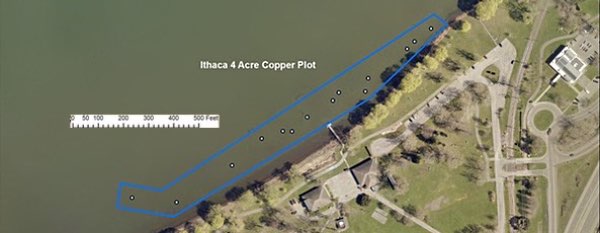- By -
- Around Town
 Print
Print 
On August 13, the US Army Corps of Engineers hydrilla team for Cayuga Lake oversaw the targeted treatment of a line of hydrilla plants in shallow water just offshore of Stewart Park using the aquatic herbicide Komeen Crystal. Led by Regional Technical Specialist Michael Greer of the US Army Corps of Engineers Buffalo District, the team worked with Solitude Lake Management to apply the herbicide directly to the plants, in a water depth of about three feet with a surface area of 4 acres.
Hydrilla plants in the middle of the treatment area were significantly impacted. However, plants hear the edges of the treatment zone showed no impact. Research shows that missing even 1 year of treatment, or allowing plants to set tubers, can set back an eradication effort more than 1 year. Based on conversations with the USACE and the Hydrilla Local Task Force, is has been decided that the USACE will apply a second treatment to the area with a particular focus on the edge plants to insure that they are not able to produce tubers. According to Michael Greer, Regional Technical Specialist, U.S. Army Corps of Engineers, Buffalo District, "The additional Komeen Crystal application is an important step to reduce the risk of hydrilla spread within the south end of Cayuga Lake and the region. It will also provide managers with important information regarding the control of small isolated patches of the invasive plant." Please see accompanying map.
At no time will the herbicide concentration exceed safe water use standards for humans, wildlife, or fish. Lakeshore residents and businesses have been notified. The use of lake water as a source of drinking water is not recommended at any time. Residents should be aware that the application concentration of 1 part per million of copper is close to the drinking water action level of 1.3 parts per million. To ensure full public confidence, water quality will be tested regularly over a 72-hour period following application. Additional tests will be made at the Bolton Point Water Plant.
Uncontrolled, hydrilla could quickly spread to fill the shallow south end of Cayuga Lake with a thick mat of dense plant growth that would inhibit boating, paddling, fishing and native species. According to Jon Negley, Tompkins County Soil and Water Conservation District, "Continued monitoring of any future plant growth and analysis of data collected will dictate any future control options pursued by the Task Force in 2019. It is anticipated that there will be no further treatments with herbicides in 2018 for Hydrilla once the September 10th treatment is finished."
v14i34



